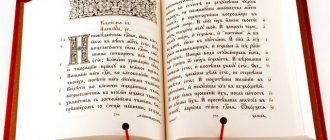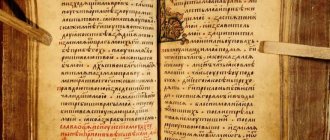Come let us rejoice in the Lord
Mikhail Zeleny. Commentary on the first stichera of Vespers on the Feast of the Nativity of Christ. Quite often, the first stichera of Vespers, which opens the service of the holiday, is very bright, memorable, as if setting the tone for the entire subsequent service. This fully applies to the first stichera of Christmas Vespers, which is extremely rich in theological content. We can say that it briefly summarizes the entire theology of this wonderful holiday. We will now begin to analyze this stichera, which contains a number of allusions to biblical and patristic texts. Its author is St. Herman, Patriarch of Constantinople, who lived in the 8th century.
| Come, let us rejoice in the Lord, | Come, let us rejoice in the Lord, |
| The real secret is telling: | Telling the real (not in the sense of “genuine”, but in the same sense as in the expression “present time”) secret: |
| The mediastinum has collapsed, | The dividing wall has been destroyed, |
| The fiery weapon gives splashes, | The fiery sword runs away |
| And the cherub retreats from the tree of life | Cherubim retreat from the tree of life, |
| And I partake of the food of heaven, | And I again receive food from heaven, |
| He was expelled from worthlessness for the sake of disobedience. | From which he was once expelled for disobedience. |
| The unchanging image of the Father, | For the unchanging image of the Father, |
| The image of Him ever present, | The outline of His eternity, |
| The slave's gaze accepts | Takes on the appearance of a slave |
| From unartificed Matera passed, | Coming from a celibate Mother, |
| Having endured no change: | Without being changed, |
| Let it be, be it, | Because what He was is what He remains, |
| This God is true: | Being the true God; |
| And it’s not even accepted | And what he was not, he perceived, |
| A man who was for the sake of humanity, | Becoming a Man through philanthropy, |
| Let us cry out to him: | Let us exclaim to him: |
| Be born of a Virgin, God, have mercy on us. | Born of the Virgin, God, have mercy on us. |
Come, let us rejoice in the Lord . These words bring to mind the angel's message to the shepherds from the Gospel of Luke (Luke 2:10-11): “And the angel said to them: Do not be afraid; I bring you good news of great joy, which will be to all people: for today a Savior has been born to you in the city of David, who is Christ the Lord.” The hymnographer invites those participating in the service to share this joy and become its participants. The real mystery is telling: In many places the New Testament speaks of the “Mystery of Christ.” One such passage is found in 1 Timothy 3:16: “And without controversy is the great mystery of godliness” (see left column).
| God appeared in the flesh, Justified Himself in the Spirit, Showed Himself to the Angels, Preached to the nations, Accepted by faith into the world, Ascended in glory. | You were born as you yourself willed, you appeared as you yourself willed: you suffered in the flesh, our God, you rose from the dead, trampling death. You ascended in glory, fulfilling all things, and you sent us the Divine Spirit to sing and glorify Your Divinity. |
We see a hymn, which, in form, resembles a stichera, in some ways echoing in meaning with the one being analyzed, and not only with it - for comparison, in the right column, the verse stichera of the Great Vespers of the Feast of the Ascension of the Lord is given: in ancient times it was included in the service of the holiday Pentecost, but in fact its content is such that it is suitable for almost all of the Lord's Feasts from Christmas to Pentecost and even Easter. The analyzed stichera of St. Herman also speaks about the Mystery of Christ. What does she see as this secret? The mediastinum of the city has collapsed These words refer to an important passage from the Epistle to the Ephesians (2:14), which speaks of Christ this way - “For He is our peace, having made both one and destroyed the barrier that stood in the middle” (“For He is our peace, having created wallpaper is one, and the mediastinum of the fence is ruined” in Slavic). “Mediastinum” literally means “that which is in the middle of the walls” or “that which is between the walls.” We are talking about the wall that once separated the “court of the pagans” in the Jerusalem Temple, where pagans could pray, from the “court of the Jews,” where they were forbidden to enter on pain of death. It really stood between two other walls - the outer wall that enclosed the temple area from the outside, and the wall that lined the “courtyard of the priests”, where it was no longer possible for Jews who did not belong to the descendants of Aaron to enter, who alone could approach the altar and other shrines Temple. In the literal sense, the apostle is talking about the destruction of the barrier that separated Jews and pagans in the era of the Old Testament: in the Church of Christ “there is neither Greek nor Jew” - all who believe in Christ become “the seed of Abram and heirs of the promises” (see Gal. 3 :28-29). But although the stichera uses the image of the “mediastinum,” it rather talks about the barrier between man and God, which Christ destroyed, reconciling man with God. However, such an understanding is not alien to the passage quoted from the Epistle to the Ephesians, since the destruction of the barrier between pagans and Jews is a consequence of reconciliation between man and God. The flaming weapon gives the splash and the cherub retreats from the tree of life and I partake of the food of paradise from the worthless expulsion for disobedience. Here we see images from the first and last books of Holy Scripture - Genesis and the Revelation of John the Theologian (Apocalypse). After the Fall, God expelled Adam from Paradise and “placed Cherubim and a flaming sword reversing in the east of the Garden of Eden to guard the way to the tree of life” (Gen. 3:4). But Christ, by His ministry, restores access to the Tree of Life, the formidable cherub with a flaming sword retreats, and therefore “He who has an ear, let him hear what the Spirit says to the churches: To him who overcomes I will give to eat of the tree of life, which is in the midst of the paradise of God” (Rev. 2:7). The Tree of Life, which bestows immortality, is Christ Himself, Who says: “He who eats My Flesh and drinks My Blood has eternal life, and I will raise him up at the last day” (John 6:54). The unchangeable image of the Father, the image of the ever-present Him. These words refer us to the first verses of the Epistle to the Hebrews, which will still be heard in the service as an apostolic reading: “God, who spoke of old to the fathers in the prophets at times and in various ways, has in these last days spoken to us in the Son Whom he appointed heir of all things, through whom also he created the worlds. This being, being the radiance of glory and the image of His hypostasis, and upholding all things by the word of His power, having accomplished in Himself the cleansing of our sins, sat down at the right hand of the Majesty on high” (Heb. 1:1-3). Another important passage of the New Testament, in many ways parallel to the above passage from the Epistle to the Hebrews, which is also appropriate to remember in connection with the stichera verse under discussion - Col. 1:14-18, where it says about Christ: “in whom we have redemption through His blood and forgiveness of sins, who is the image of the invisible God, the first begotten of all creation; For by Him all things were created, that are in heaven and that are on earth, visible and invisible: whether thrones, or dominions, or principalities, or powers - all things were created by Him and for Him; and He is before all things, and by Him all things stand. And He is the head of the body of the Church; He is the firstfruits, the firstborn from the dead, that in all things He may have preeminence.” Christ is also called the image and glory of the Father in a number of other places in the New Testament. What this means is best explained by Christ Himself, speaking about Himself - “he who has seen Me has seen the Father” (John 14:9). The image of a slave accepts, This is the focus of the mystery that is sung in the stichera: The image of God takes on the image of a slave: “He, being the image of God, did not consider it robbery to be equal with God; but he made himself of no reputation, taking the form of a servant, becoming in the likeness of men, and becoming in appearance like a man; He humbled Himself, becoming obedient even to the point of death, even death on the cross. Therefore God has highly exalted Him and given Him the name that is above every name, so that at the name of Jesus every knee should bow, in heaven and on earth and under the earth, and every tongue confess that Jesus Christ is Lord, to the glory of God the Father” (Phil. 2:6-11). It also speaks of Christ as the Image of God, just as we read above in the Epistle to the Hebrews and Colossians. He is equal to God, as they say, “by right” - this is the meaning of the somewhat vague words “he did not consider it robbery to be equal with God” (“not to be equal to God by admiration” in Slavic). But a new aspect is also revealed in comparison with the words from the Epistle to the Hebrews - He takes on the form of a servant, humiliating (literally “emptying”) Himself, becoming a man and accepting death on the cross, the fruit of which for Him is the acquisition of “the name that is above every name” and “every authorities in heaven and on earth” (Matt. 28:18). Well, it was said earlier about the fruit for those who believe in Him: this is the destruction of the “mediastinum” and the return of access to the Tree of Life. From the unartificed Matera he passed, and there abideth, this God is true. And even if Man was not accepted for the sake of humanity, It is said here how exactly the Image of God took on the form of a servant: while remaining who he was, He was incarnated from the Mother of God, taking on what He was not before His incarnation. These lines are a poetic exposition of the words of John Chrysostom, “while remaining Who He was, He became what He was not,” spoken by him when interpreting that very passage from the Epistle to the Philippians, which was quoted above. To this we cry: Be born of the Virgin, God, have mercy on us. Beginning with the call to rejoice in the Lord and expounding the mystery of Christ, the stichera ends with a prayerful appeal to Him.
Share link:
Verse: Bring my soul out of prison to confess to Your name.
Come, let us rejoice in the Lord, who crushed the power of death and enlightened the human race, calling with the bodiless: Our Creator and Savior, glory to Thee.
Verse: The righteous women are waiting for me, until then reward me.
Thou hast endured the cross, O Savior, and burial for our sake, and even as God has put death to death, we also worship Thy three-day resurrection: Lord, glory to Thee.
Verse: From the depths I cried to You, O Lord, O Lord, hear my voice.
The Apostles, having seen the resurrection of the Creator, marveled, singing the praise of the Angels: this is the glory of the Church, this is the wealth of the Kingdom: you who suffered for us, O Lord, glory to Thee.
Other stichera, Anatolievs, the same voice.
Verse: Let Your ears be attentive to the voice of my prayer.
Even though you were, O Christ, from lawless men, but You are my God, and I am not ashamed, You were beaten with lashes, I am not swept away, You were nailed to the cross, and I do not hide: I boast in Your rebellion: For Your death is my belly , Omnipotent and Humane-loving Lord, glory to You.
Verse: If you abide iniquity, O Lord, O Lord, whoever stands; for You have purification.
Fulfilling the Davidic prophecy, Christ revealed His majesty in Zion as a disciple, showing Himself praised, and ever glorified with the Father and the Holy Spirit: first of all, incorporeal, like the Word, but for our sake incarnate, and put to death like a man, and resurrected with power, like a Lover of Humanity.
Verse: For Thy name's sake I have endured Thee, O Lord; my soul has endured in Thy word; my soul trusteth in the Lord.
Thou hast descended into hell, O Christ, as thou hast willed: thou hast abolished death, as God and Master: and thou hast risen on three days, having resurrected Adam from the bonds of hell and corruption, calling and saying: Glory to Thy Resurrection, O One Lover of Mankind.
Verse: From the morning watch until the night, from the morning watch, let Israel trust in the Lord.
You were laid in the tomb as if you were sleeping, Lord: and you were resurrected for three days, as you are strong in strength, having raised Adam from mortal aphids, as you are Omnipotent.
Other stichera to the Mother of God, Paul of the Amorites, tone 2.
Similar to: Ever from a tree:
Verse: For with the Lord is mercy and abundant deliverance, and He will deliver Israel from all their iniquities.
Thou art the Joy of Angels, Thou art the Glory of men, Thou art the Faithful Hope, the All-Singing Lady, our Representative: and to Thee we resort in every need, as through Thy prayers, from the arrows of the enemy the destruction of the soul, and from all sorrows we will all be delivered from praising Thee, O Blessed One.
Verse: Praise the Lord, all you nations; praise Him, all you people.
You are the Mother of God, the Hope, You are the Representative and the wall and the refuge, the Mistress of God, who unartfully gave birth to the Savior of the world in the flesh: You, with Your prayers, deliver us from the temptations, troubles and circumstances that beset us, One Christian Refuge.
Verse: For His mercy is established upon us, and the truth of the Lord endures forever.
Tame the aspirations of my flesh, extinguish the flame of my passions, take away from me, Mother of God, the evil knowledge of my desires, and my unyielding custom, return the Virgin from every demonic aspiration: for in the silence of my heart, and in the dispassion of my soul, I will sing praises to Thee, the All-Singing One.
Glory, even now, to the Mother of God:
Thou art known to the Mother, more than nature, to the Mother of God, and Thou art the Virgin, more than words and reason: and the miracle of Thy Nativity the tongue cannot tell. I am glorified for the essence of conception, Pure, the image of birth is incomprehensible: wherever God wants, the order of nature is overcome. Moreover, all of you, Mother of God, we diligently pray to you, pray for the salvation of our souls.



